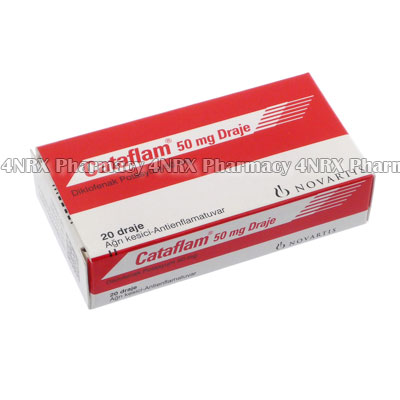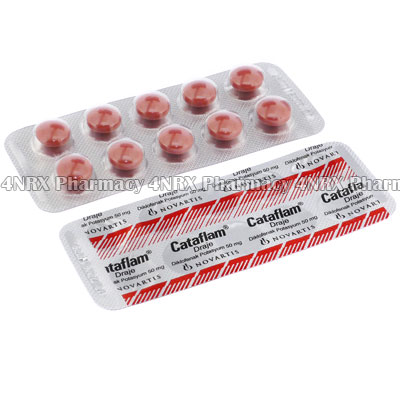 |
Home  Arthritis Arthritis  Cataflam (Diclofenac Sodium) Cataflam (Diclofenac Sodium) |
|
|||||||||
|
|
Cataflam (Diclofenac Sodium)
What is Cataflam (Diclofenac Sodium) used for? This medication is manufactured in Turkey and contains no English documentation. Cataflam (Diclofenac Sodium) is a non steroidal anti inflammatory drug (NSAID) prescribed to treat patients suffering from inflammatory conditions such as rheumatoid arthritis, gout, back pain, or pain caused by accidents such as sprains or strains. It operates by suppressing the release of enzymes that cause the irritation, pain, and swelling associated with these conditions to relieve these symptoms. Your physician may also prescribe it to treat other unlisted conditions. How should I use Cataflam (Diclofenac Sodium)? Cataflam (Diclofenac Sodium) should always be taken according to your physician's instructions to get the safest and most effective results. Even though one tablet is typically administered once each day, your individual dosage and application frequency will depend on your health and the severity of your symptoms. Swallow these doses whole along with a full glass of water. Never crush, chew, or split the tablets as this may destroy or change the effects of the contents. Ask your pharmacist or physician if you have any questions to ensure the correct administration. What are the side effects of Cataflam (Diclofenac Sodium)? Cataflam (Diclofenac Sodium) may cause side effects in some patients such as:
Tell your physician if these symptoms become worrying to you or if more serious side effects such as muscle stiffness, severe chest pain, bloody vomit, discolored urine, sensitive skin, unusual weight gain, a severe skin reaction, or jaundice occur. These conditions may require alterations to your regimen to prevent further problems from appearing. Please Note Cataflam (Diclofenac Sodium) should not be used to treat patients who are in the third trimester of a pregnancy or have an ulcer, heart failure, or an ulcer. Also inform your physician if you have controlled heart failure, asthma, hypertension, blood circulation disorders, ulcerative colitis, or porphyrias as these conditions may cause complications during treatment. Strictly follow all instructions provided to you by your physician or pharmacist while using Cataflam (Diclofenac Sodium). Optimum and safe dosage can differ based on the patient and the condition being treated. As this medication may be unsafe for certain patients, it is essential you always inform your physician if you are pregnant or breastfeeding, as well as if you have any allergies, other illnesses, or ongoing health conditions, and if you are taking any other form of medication, supplements, or herbal products. Immediately seek emergency medical care if you have an allergic or hypersensitive reaction. Common signs of a reaction include hives, swelling, skin rashes, chest pains, as well as trouble breathing or swallowing. 

|
||||||||||||||||||||||